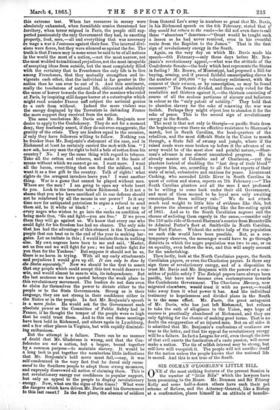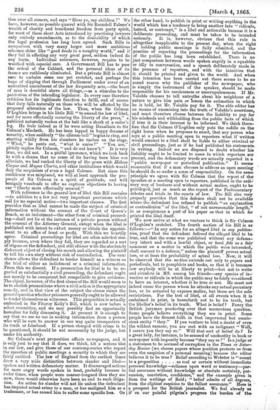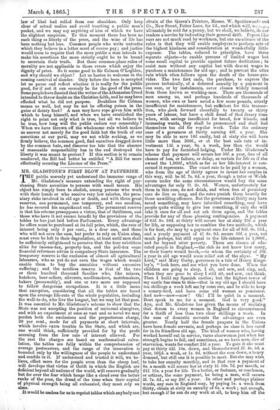SIR COLMAN O'LOGHLEN'S LITTLE BILL.
ONE of the most striking features of the present Session is the number of "little Bills" which the lawyers have been presenting to the House. Mr. Denman and Sir Fitzroy Kelly and some half-a-dozen others have each their pet scheme of Reform, and the Attorney-General, like a Bishop at a confirmation, places himself in an attitude of benedic-
tion over all comers, and says "Bless ye, my children !" We have, however, no possible quarrel with Sir Roundell Palmer's wealth of charity and beneficent freedom from party spirit, for most of these short Acts introduced by practising lawyers only embody amendments, as to the desirability of which the legal profession has long been agreed. Such Bills in comparison with very many larger and more ambitious schemes shine like "good deeds in a naughty world," and if they fail in effecting any very great good, seldom indeed do any harm. Individual reformers, however, require to be watched with especial care. A Government Bill has to pass
the ordeal of the Cabinet, and the personal ideas of its framer are ruthlessly eliminated. But a private Bill is almost sure to embalm some one pet crotchet, and perhaps the hope of slipping that through Parliament under cover of an undoubted amendment of the law frequently acts,—the heart of man is deceitful above all things,—as a stimulus to the patriotism of the intending legislator. In every case therefore criticism has its legitimate function to fulfil, and of course that duty falls naturally on those who will be affected by the proposed alteration of the law. Thus, when Sir Colman O'Loghlen brings in his little Bill "to amend the law of libel, and for more effectually securing the liberty of the press," a publicist naturally rushes at the bait like a shark at a sailor's leg. He feels indeed as if he were acting Donalbain to Sir Colman's Macbeth. He has been lapped in happy dreams of security, when suddenly "the altirum-bell " begins to ring, and starting wildly from his slumbers he rushes on the stage. "What," he pants out, "what is amiss ?" "You are," pithily replies Sir Colman, "and do not know't." It is very true, we did not. In a pitiful ignorance, which we look back to with a shame that no sense of its having been bliss can alleviate, we had ranked the liberty of the press with Habeas Corpus and Magna Charta, and other institutions which would defy the scepticism of even a legal Coleus°. But since this confidence was misplaced, we will at least approach the pro- posals of Sir Colman in a spirit of gratitude, and will benignly vouchsafe to offer no captious objections to having our "liberty more effectually secured."
With reference to the general law of libel this Bill contains —in addition to a few not very important provisions which call for no especial notice—two important clauses. The first provides that as libel cannot be made the subject of criminal information without the consent of the Court of Queen's Bench, so an indictment—the other form of criminal proceed- ing--shall not lie at the instance of a private person without the consent of the Attorney-General, extept when the libel is published with intent to extort money or obtain the appoint- ment to an office of trust or profit. With this we heartily agree. Criminal proceedings for libel are often selected sim- ply because, even where they fail, they are regarded as a sort of stigma on the defendant, and still oftener with the absolutely dishonest object of closing his mouth and allowing the plaintiff to tell his own story without risk of contradiction. The next clause allows the defendant to tender himself as a witness ou the trial of either an indictment or a criminal information. From this we dissent. If a prosecution for libel is to be re- garded as substantially a civil proceeding, the defendant ought not merely to be competent but compellable to give evidence. The object, however, of the first clause of the Bill would seem to be to abolish prosecutions where a civil action is the appropriate remedy, and in that view of the subject the clause raises the general question whether prisoners generally ought to be allowed to tender themselves as witnesses. This proposition is actually embodied in Sir Fitzroy Kelly's Bill, which is now before a select committee, and we may possibly find an opportunity hereafter for fully discussing it. At present it is enough to say that we see no use in seeking information from a person who will be sure to answer in one way quite irrespective of its truth or falsehood. If a person charged with crime is to be questioned, it should be not necessarily by the judge, but under his authority.
Sir Colman's next proposition affects newspapers, and it is only just to say that it does, we think, hit a serious blot in our law, and give those of our contemporaries who report the speeches at public meetings a security to which they are fairly entitled. The law of England from the earliest times drew a very wide distinction between slander and libel— spoken and written defamatory matter. It discouraged actions for mere angry -words spoken in heat, probably because in ruder times, when people were coarser-tongued than they are now, there would otherwise have been no end to such litiga- tion: An action for slander will not lie unless the defendant has imputed actual crime to a man, or has maligned him as a tradesman, or has caused him to suffer some specific loss. On the other hand, to publish in print or writing anything in the world which has a tendency to brinab another into "ridicule, hatred, or contempt," is a libel and actionable because it is a.
deliberate proceeding, and must be taken to be intended seriously. It is, however, obvious that this rule is altogether inapplicable to the present day, when the right of holding public meetings is fully admitted, and the practice of reporting the proceedings for the information
of the public has long been established. There is no- just comparison between words spoken angrily in a squabble- or idly in conversation, and a speech deliberately made in the presence of reporters, and with the intention that. it should be printed and given to the world. And when this intention has been carried out there seems to be no sound reason why the publisher of the newspaper, who is simply the instrument of the speaker, should be made- responsible for his carelessness or unscrupulousness. If Mr. Voluble chooses to tell untruths about his neighbour of a nature to give him pain or lessen the estimation in which he is held, let Mr. Voluble pay for it. The able editor has no means of examining into the truth of Voluble's assertions, and must therefore choose between the liability to pay for his misdeeds and withholding from the public facts of which if true it is their interest to be informed. We think there- fore that Sir Colman O'Loghlen only puts the saddle on the right horse when he proposes to enact, that any person who- says at a public meeting open to reporters what if written would amount to a libel shall be liable to either criminal or civil proceedings, just as if he had published his statements. in writing. Indeed we are disposed to doubt whether his liability ought to be limited to cases in which reporters are present, and the defamatory words are actually reported in a "public newspaper or periodical publication." It seems reasonable that if a man chooses to address an open meeting • he should do so under a sense of responsibility. On the same- principle we agree with Sir Colman that the report of th& speeches at a meeting open to reporters, published in the ordi.: nary way of business and without actual malice, ought to be- privileged, just as much as the report of the Parliamentary debates and trials in the courts of law. The Bill also very properly provides that this defence shall not be available- where the defendant has refused to publish "an explanation or contradiction" of the libel, " of not unreasonable length," in as conspicuous a part of his paper as that in which he printed the libel itself.
We now arrive at what we venture to think is Sir Colman O'Loghlen's crotchet. The fourth section of his Bill is as follows:—" In any action for an alleged libel in any publica- tion, proof that the defendant believed the alleged libel to be true, and that the same was published without any defama- tory intent and with a lawful object, or bond fide as a fair comment on a matter in which the public were interested,. shall amount to a defence," unless the plaintiff proves actual loss, or at least the probability of aetual loss. Now, it will be observed that the section extends not only to papers and periodicals, but to pamphlets and books, so that if it becomes. law anybody will be at liberty to print—but not to write and circulate in MS. among his friends—any species of in- vective or ridicule in which the public may be fairly considered/ to have an interest, whether it be true or not. He must not indeed cause the person whom he attacks any actual pecuniary loss, or be actuated by express malice, but these are the sole- restrictions. For the test of libel, at all events when it is. embalmedin print, is henceforth not to be its truth, but. the libeller's belief in its truth. What is belief ? Fancy the- British juryman pondering over that momentous question. Some people believe everything they see in print. Some people have the firmest faith in that impersonal but omnis- cient entity "they." If you venture to hint a doubt of even the wildest rumour, you are met with an indignant "Well, I assure you they say so." Will that sort of belief do ? a great lady, for instance, to be accused of unchastity in book or newspaper with impunity because "they say so ?" Is a judge or a statesman to be accused of corruption in the Times or Satur- day Review (we choose papers whose position protects us from even the suspicion of a personal meaning) because the editor believes it to be true ? Belief according to Webster is " assent to a proposition . . . . as real or certain without immediate personal knowledge—reliance upon word or testimony—par- tial assurance without knowledge or absolute certainty, per- suasion, conviction, confidence,' and the example given is from the writings of Reid; "belief admits of all degrees, from the slightest suspicion to the fullest assurance." Here is - a prospect for the British journalist. We feel already as if on our painful pilgrim's progress the burden of the law of libel had rolled from our shoulders. Only keep dear of actual malice and avoid touching a public man's pocket, and we may say anything of him of which we have the slightest suspicion. To this moment there has been no such thing as liberty of the press, and the wine of life has been nothing but lees. Common people who write untruths which they believe in a letter must of course pay; and justice would seem to require that the more public a man intends to make his assertions the more strictly ought he to be bound to ascertain their truth. But these common-place rules of morality are not applicable to those errors which enjoy the dignity of print. So it seems good to Sir Colman O'Loghlen, and why should we object ? Let us hasten to welcome in the coming carnival of slander. Only before the boon is accepted let us pause and reflect whether it is really for the public good, for if not it can scarcely be for the good of the press. Some people have fancied that the writer of theAthanasian Creed intended to throw doubt on the Christian faith, and he may have effected what he did not purpose. Doubtless Sir Colman means us well, but may he not be offering poison in the guise of dainty food? A man may have rope given him with which to hang himself, and when we have established the right to print not only what is true, but all we believe to be true, how long will the public endure our censorship ? When we have thrown off the wholesome rule which makes us answer not merely for the good faith but the truth of our assertions at our peril, may we not while seeking, as we firmly believe, the common good, find ourselves dragged down by the common hate, and discover too late that the absence of reasonable responsibility has in the end destroyed the liberty it was meant to protect.? If this section is to remain unaltered, the Bill had better be entitled "A Bill for more effectually securing the Licence of the Press."
































 Previous page
Previous page